
..........................................................................................................................................................................................................
alf engers aka 'the king. a film by ray pascoe. rayfilms dvd £19.99
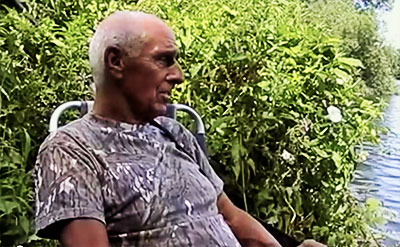
i am led to believe that the competitve instinct is one that remains throughout life. it may change direction slightly or transmogrify itself onto another discipline altogether, but much like the dictate that 'momentum is conserved', so too is the need to win at all costs.
it is something of an unexpected series of moments in the opening chapter of ray pascoe's excellent film about time triallist alf engers therefore to find the great hero of his time setting out for a day and night's fly-fishing accompanied by monty the spaniel, a deckchair and a small tent. i believe it may be pascoe himself who asks whether it really matters whether or not he catches anything, to which engers replies "well, it would be nice to catch (something), but no, it doesn't really matter."
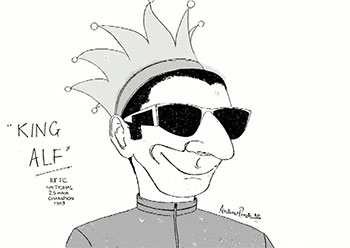
"cycling ceases to become fun if you've got to win. if you have to win you don't sleep at night."
the film opens with a voiceover asserting to engers' more unpleasant character traits: he was a rebel, a mutineer in the quiet waters of time-trialling. he was a chancer, an egotist, a showman, a man with a chip on his shoulder, a man with something to prove. he was a man who needed to excel. he was an awkward bastard. he was a genius." it's a tribute which, thankfully, isn't overly cited throughout the remainder of the film, though there is little left to doubt about his competitive spirit and rebellious personality.
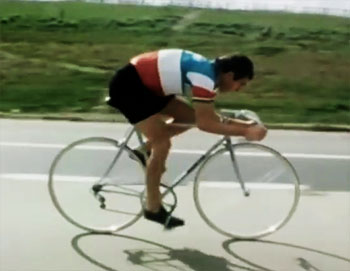
after an operation to remove his kneecap following a fall from his bike at the age of fourteen, engers was no longer able to participate in the sports at which he had excelled at school; swimming and running. he therefore turned to cycling to let loose his competitive nature. the character flaws detailed in the opening segment were already noticeable in his teenage years, having been expelled from school and already received a written warning from the road time trials council (rttc) at the age of 16. "a controversial character."
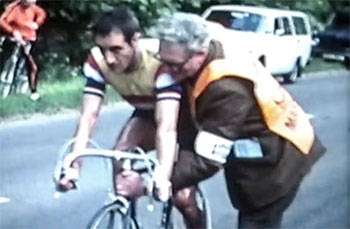
on leaving engers preparing for an evening's worth of carp fishing in the lea valley, pascoe's film occupies itself primarily with a series of 'talking heads' including lengthy and remarkably honest contributions from the man himself, frequently accompanied by archive footage not only of wartime in kings cross where his father owned a bakery, but of time-trials and races across the late fifties and sixties. the family bakery collapsed under german bombing with alf and his father inside and they subsequently moved to a farm in barnet where engers joined his first cycle club at age 12.
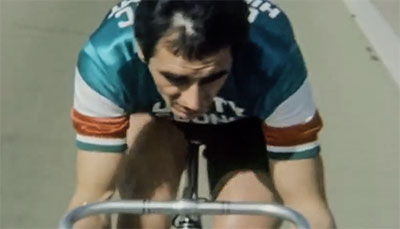
he was offered an independent contract by gerrard cycles in the early sixties, classifying him as midway between amateur and professional. his other work and family commitments meant that he rarely raced and two years later applied to be reinstated as an amateur. this was refused. so despite the characterisation of engers as being something of a troublemaker in the world of 1960s cycling, it's likely that the authorities were every bit as much to blame, hampering his cycling career until 1968 when he finally re-achieved amateur status.
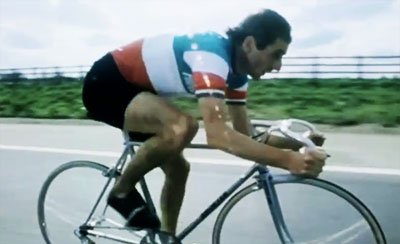
the film allows engers to narrate the bulk of his career, from being allowed to follow british road race champion, ted gerrard and learn at first hand the preparation that britain's most successful rider of the time undertook. however, ray pascoe has steered clear of making of this movie an engers monologue by incorporating pertinent and often complimentary interviews with contemporaries such as the higginson twins, alan rochford, an impressed sounding sean yates, phil griffiths and others from the era.
engers' glory years were encapsulated in those from 1972 to 1976 when he won the national 25 mile time-trial championship five years in succession. in the latter part of the king, engers is brought once more into contact with the custom built, shorter frame that carried him to so many victories. though currently existing purely as a frame and forks along with a pair of wheels, though engers rarely comes across as a nostalgist, there's a tear in his eye as he stands once more behind that frame.

among the substantial extras included on this dvd are a photo gallery, archive 8mm film of the 1975 men's 25 mile time-trial and team time trial along with a feature that sees john harvey and richard wall taking a close look at ted gerrard's 1960's road bike.
engers was obviously one of the more enterprising time-triallists of his era, looking at every aspect of his bike, including rear facing brake levers and front caliper, to give him an advantage over his rivals. the embodiment of that competitive spirit to which i alluded at the start. however, those modifications are as nothing compared to the lengths to which the modern-day frame manufacturers have gone in the same direction.
engers and his contemporaries were privateers without access to that which is pretty much taken for granted nowadays. ray pascoe's film is not only about alf engers, but about a niche part of british cycling heritage the likes of which we're unlikely to see again. in those days, riders in local and national time-trial competitions were able to "ride in a straight line" ostensibly before the motor car infiltrated every last square metre of road space.
the king is every bit as much social commentary as it is about cycling. modern-day family history societies emphasise the desire to discover from whence we originated, a desire that ought surely to apply to every british cyclist too?
tuesday 17 march 2015
 ..........................................................................................................................................................................................................
..........................................................................................................................................................................................................